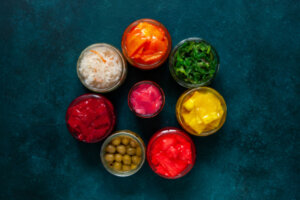What’s a Microbiome, Why Should I Care, and What Do I Do About It?

What’s a microbiome?
Humans host 39 trillion microscopic organisms in every conceivable place in our bodies, from head to toe, inside and out -- and they are called microbiomes. Yep - made up of microbes. There are tons of different groups or colonies all over our bodies. Seriously -- each tooth is like its own little village!
The most important microbiome:
All the microbiomes are super interesting. Your left eye has a different balance than your right eye! Each kidney has one! One of the best ways to stay well is to take good care of your gut microbiome in the colon - the very last piece of the large intestine.
Why should I care?
You care - you really do! - because teensy organisms in your gut influence and direct your mood, how well you focus and think, whether or not you stay well, how you poop (seriously) when you feel full, your blood sugar balance and energy, what foods you crave, and even your sleep!
We pick up these organisms beginning when we are born. From there, everything in the world gives us more. They’re in our food and drinks. They transfer from the carpet, floor, air, dirt, other humans, and our dogs and cats. Surprisingly, our microbiomes are pretty much set by age 2. Wild, right?
So … I thought microbes make us sick.
Usually, we think of bacteria and viruses as bad - even dangerous. And they sure can be! That’s why we have antibiotic medications to kill bad (also called pathogenic) bacteria that make us sick and vaccines so we can fight off viruses like COVID-19 and the flu.
Our gut microbiome is crazy complex. Believe it or not, there are bacteria, viruses, and yeasts that actually help keep us well! A healthy amount of good microbes literally are part of our machinery to keep us functioning. Of course, other things in our lives also can support or interfere with how our bodies work, but our microbe composition is really important. We often mess with that balance, screwing up what we built as babies.
What throws the gut microbiome out of balance?
- Low-nutrient foods: refined sugars (white table sugar), refined flour (white flour), and ‘vegetable’ oils (corn, soy, canola, etc.).
- These can feed ‘bad’ bacteria, yeasts, and others.
- Too few/too little variety of fruits, vegetables, and whole grains (important nutrients and fiber that feed good microbes).
- Alcohol.
- Antibiotics (sometimes they are necessary).
- Antimicrobial soaps and cleaners (almost never necessary).
- Excess stress and/or lack of peace/mindfulness, etc..
- Little exposure to the outdoors, sunshine, weather, plants, soil
What happens when pathogenic (bad) microbes take over the gut:
- Gut lining becomes damaged and inflamed.
- Undigested food and ‘bad’ microbes escape into our bloodstream, setting off immune system fire alarms.
- We start to hurt - head, joints, tummy, etc.
- Reflux, bloating, stinky gas, bad breath, constipation, diarrhea.
- Brain function suffers as our bodies’ communications systems grind more slowly.
A damaged gut absorbs fewer nutrients from food. We really are what we eat. Fatigue sets in. Sleep is thrown off. Mood/focus chemical production and maintenance tanks. Anxiety or depression gets worse. Focus and attention spiral down. Thinking and making connections get harder. It seems contrary, but this whole thing can ramp up hyperactivity or confusion as the body struggles to stay stable.
So what do you do? Nourish your gut’s microbe garden!
- Variety of colorful foods - nutrients/fiber: vegetables (cooked and raw), fruits, whole grains, beans/legumes, nuts/seeds, herbs/spices.
- Traditional food prep: extra virgin olive oil, avocado oil, coconut oil, butter, ghee, pickled vegetables (not the kind made with vinegar), bone and/or meat broths, vegetable broths, traditional vinegar (raw apple cider vinegar ‘with the mother’ is tops, but others are great, too), aged cheeses or soft cheeses traditionally prepared, etc.
- Why are traditional prep methods important? They keep the nutrient value intact or even enhance it.
- Probiotic-rich foods repopulate the gut: yogurts, kefir, cottage cheese, kimchi, kombucha, kvass, miso, sauerkraut, pickled vegetables (made with water, salt, herbs), natto, brine-cured olives, tempeh, raw apple cider vinegar ‘with the mother.’
- Reduce/stop alcohol.
- Mindfulness, breath work, and observation-awareness practices.
- Adequate rest and sleep. So, so important!!!
- Positive, supportive relationships.
- Movement that leaves you energized, not tapped out. Know when to rest.
- Walks in nature. Playing in the soil (gardening). Growing your own food.
OMG! Food will be so boring now!
Nah. Don’t throw out the baby with the bathwater. Have fun with food! It’s not all or nothing!! Play around with this information and find out what works for you. Just don’t eat foods if you’re allergic to them.

